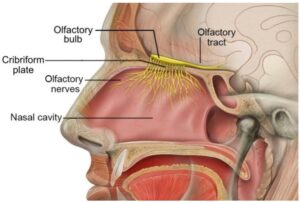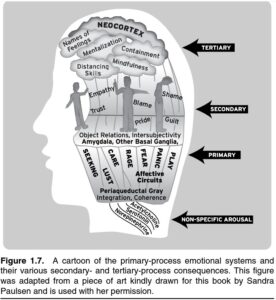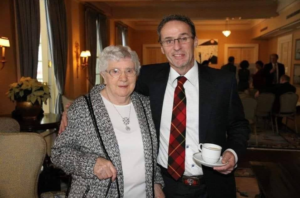CERTAINTY & UNCERTAINTY
AWE
The more we focus on our own emotions and thoughts, the more we tend to suffer from anxiety and depression. Rumination = Omphaloskepsis (navel gazing)
I have a whole course on anxiety which is probably too much for most people even though it contains everything you need to know about the subject.

(^ Don’t be like one of these muthas)
It is obvious that since the beginning of Homo Sapiens we developed under a prayerful spirituality which attempts to reconcile our situation on earth in relation to the heavens above.
To this point, let me tell you about the week before my mother died.
I was visiting with her in hospital. Cancer had spread from her bowel to her liver, and she had days to live. We spoke about many things including her lifelong devotion to the Catholic church.
She was one of those women who, after spending a couple of decades knitting mitts and sweaters for her nine children, continued to do the same for the less fortunate. She collected pop can tabs and engaged in whatever other initiatives her church undertook to help others. She was one of those gals who were trusted to count the offerings from the faithful after mass each week.
She served. Ten pregnancies in twelve years. With a brood like hers, what else could she be?
At one point during this last private conversation, as we reviewed her Christian life, and curious, I asked her if now, looking back, she still saw things the same way.
She was in pain but reached over and patted my arm with her left hand and said unreservedly, “Oh yes, Christopher, you’ve got to have a bit of faith.”
It was to be her last advice.
At the time, I remember searching my heart and mind for a way I could appease her with some kind of reassurance that I too would have faith. That her dying words would be meaningful enough to take with me as her gift and remain useful in her name long after she was gone.
I’d been an altar boy at our French Catholic church as a young boy (unmolested). In my thirties, I attended Anglican mass most Sundays and even converted to Anglicanism because they allowed women priests. Having four sisters instills that kind of loyalty to the sisterhood, I suppose.
I found I was not able to match her faith, so I promised I’d keep room in my life for mystery.
She seemed content with that, as if that would do.
I, in turn, have kept my word.
Because, you see, at the edges of mystery is where you find awe.
Awe is what you see in the magnificence of sunrises and sunsets, in the majesty of mountains and the expanses of oceans. It is what you feel experiencing the Aurora Borealis or a sky full of planets and distant stars while surveying the Milky Way far away from the lights of the city.
Awe and mystery allow for both gratitude and wonder, and more importantly, for possibility.
NUTS AND BOLTS
Let me repeat that you are run by your nervous system with conscious awareness along for the ride. What you feel today, you have felt before. There is nothing new to the predictive brain which relies on past experiences to make context dependent predictions in the moment.
As you let that mouthful of a last sentence sink in, consider there is more…
Imagine how information from your surroundings is picked up by your senses and directed by the thalamus to various areas of the brain. Realize too that the sense of smell has its own routes through two olfactory bulbs situated just above the nasal cavity under the forebrain.

Practically speaking, there is a difference between walking down the street of a small town in the middle of the day and hustling along a sidewalk in South Chicago after dark.
The environment acts on the body, be it from people, your location, from the wind, rain, sun, darkness of night or light of day, cold of winter, heat of summer, how you are dressed, etc..
These outside influences mix with your internal state. By that I mean you might be cold or hot, tired from a sleepless night, or hungry because it’s near mealtime. Maybe you are exhausted from working out or working at your job. You could be suffering from seasonal allergies or a cold or flu. Or perhaps you are thirsty and even, dehydrated.
These external and internal conditions combine to create two shades of something called affect: valence and arousal. Are you comfortable or uncomfortable, aroused or relaxed?
This affective body state gets sent upstairs by special electrical and chemical messengers to the brain stem with primary, secondary and tertiary effects.
We should mention affective reality: that’s when we give too much credence to our body state and fail to weigh alternatives. We can be fooled by this. The body keeps the score someone said. How many times has my bad back decided my attitude and made my decisions?
Primary signaling involves seven emotional mechanisms: seeking, lust, care, rage, fear, panic/grief and play. Of these seeking is used the most. It’s your “getting stuff” feeling. That’s you as pursuer looking for food, water, sleep, fun, safety, pussy, or just trying to get shit done. Seeking.

When something thwarts seeking, rage (anger) kicks in to punish or correct the interference.
Lust, fear, care, and play are obvious emotional mechanisms requiring no explanation.
Note though, in 1995, a meta-analysis of 60 years of attachment studies found that our whole emotional system was tied to belonging. When we fulfill our need to belong, our emotions rise, when we disconnect, our emotions fall.
That’s why of the seven mechanisms, panic/grief is the strongest. Anything that separates us from the herd gets our attention at an existential level. It’s why grieving over a deceased loved one can be devastating. It’s why breaking up is so hard to do.
It’s also how abandonment fear is installed in a child to leverage survival and sociability. In fact, no matter the parent’s sensitivity, some abandonment fear in a child is unavoidable.
These seven basic emotional mechanisms are further processed through the amygdala, basal ganglia, and the infra-limbic (emotional) centers to influence how well you interact with others. It is here that empathy, trust, blame, pride, guilt and shame occur.
At the top, or tertiary level of signaling, is the neo cortex. This is your conscious awareness and includes all the ways you label feelings, imagine things, daydream, and so forth.
Note the prefrontal cortex is where you carry the judgments and rules installed in you with language, primarily by parents and other caregivers. Freud called this your Super Ego. When you ruminate, that’s whose pattern of ancient judgments you are following.

Most of the 30-40 trillion cells of your body have a limited lifespan and are replaced forthwith by cloning themselves and dying off under the processes of apoptosis and autophagy.
The skin sloughs off monthly, the digestive track every couple of weeks. Your bones turn over every 7-10 years. Not so the 86 billion neurons of the brain and the 500 million neurons of the body.
You may have lost some of these to illness, concussions, or drunken black outs (if you were like me), but overall, you have the same neurons you were born with (you added some over time as you aged and grew). These hold your memories and feelings and create your thoughts.
From your experiences the body brain’s neurons are trained to form concepts and beliefs, like a set of rules used in the future to make predictions. Then you confirm or deny these suppositions or best-guesses according to the social reality before you.
Change only comes with awareness. Most people haven’t a clue of these things. It means you have less free will than you think and more that when aware you have a version of “free won’t.”
UNCERTAIN vs CERTAIN
So why am I telling you this? Because few men realize the extent to which past experiences are driving their present thoughts and feelings. This offers an opportunity for radical responsibility.
After all, you own just three things in this world: your thoughts, feelings and behaviour.
So you might ask “should I trust my gut more?” The answer is maybe, maybe not.
After all, the two hemispheres of the brain evolved so you can see and focus on what is in front of you while also keeping in mind the bigger picture of what is a little further outside your purview.
There are characteristic ways the left and right hemispheres of the brain operate. The left speaks in language and logic, analysis and judgment. The right understands language but speaks in feelings and flashes of insight.
The idea is to NOT just “trust your gut” infallibly. Neither is the idea to over-judge nor suffer a condition known as “paralysis by analysis” every time you face something new.
So, here’s a rule: If you know a lot about a subject, give more credence to your gut feelings because they are probably right. However, when you don’t know much about what you are considering, use your analytical brain and enlist feedback from others to make a judgment in the moment and be willing to course-correct if necessary.
Men Defend, Deliver and Decide. Knowing the above will help you make better decisions.
As an aside, I suspect what frustrates men about how women think is sourced in this dual hemispheric thinking, where many women trust their gut even when they know little of the subject. But when a women knows the subject well, it’s worth listening to her more carefully.

Many of our problems arise because we refuse to trust our guts when we should, or we trust our intuitive selves when a thorough analysis of a problem and potential solutions would be better. Use the rule to stack the odds in favour of good decision making.
Realize what a human says is not fully representative of who they are. Rather, most of what we say to each other is a trial balloon floated for feedback. Stay humble, it’s another best guess.
I say anxiety (like depression) is a temporary loss of faith in the future. That’s tough for humans because facing uncertainty means the unknown is staring back at us from the abyss. Oh no!
We need a few things, needs let’s call them, and certainty is one of them. It’s nice to know who will still be in your life tomorrow, where you are waking up, or how you will pay your bills next month.
Certainty is by no means certain and is constantly being fucked with by uncertainty. The thing to keep in mind is that we also need uncertainty. Imagine if everything was predictable and everyone knew exactly how things were about to unfold. What a boring life that’d be.
It is uncertainty that forces us to consider new options and explore new territory, to come up with novel ideas and find new paths forward. Uncertainty is what happens every time a woman gets naked in front of you for the first time. Uncertainty is both fear and excitement, depending.
Which brings me to my point about awe.
With a little practice, when you invite awe and allow for mystery in your life you begin to notice it everywhere: in the world at large, in the people around you, and even, in yourself.

My ma could use her faith to find answers to unanswerable questions. Me, not so much.
I prefer to see God as a metaphor for nature and leave room for mystery. This allows me to experience life on that edge between excitement and fear, and nurture states of awe.
Not a chance I’m perfect at it but it does allow me to make more room for the 3Ps: possibility, potential, and promise. At times, I even begin to see the interconnectivity of all things.
If you follow me, I’m suggestion a good balance between uncertainty and certainty is awe.
From there, anxiety has little chance of taking hold with any lasting effect.
Mystery brings possibility, potential, and the promise of awe. It’s curiousity on steroids.
In the end, what matter most is to remember that we are all staring at the same heavens.
Questions? Comments?
true and free…
cw
book a call with me here
Our FB NG Group
Get the Sipping Fear book here:

